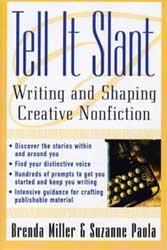The first time I went on a writing retreat, I had no idea what I was doing. And get this: I went for
two months! I arrived at
Hedgebrook on Whidbey Island, in the winter of '94, with my clunky Mac Classic in tow, a box of books, a sack full of travel journals, and lots of
big ideas about writing.
I soon found out, rather painfully, that big ideas about writing often lead you nowhere. Those big ideas sit in the middle of the room, daring you to write something
good. Something good and something
long. They glower at you. They grumble and complain. They make you hungry just an hour after breakfast. They give you a whopping headache. They make you look at the clock and wonder if anyone would notice if you just headed home, say, 7 weeks early.
The cottage had a padded windowseat, a sleeping loft, a tiny woodstove, and a long desk by a window that looked into the woods. The cooks brought your lunch to you in a basket and tiptoed away. You could bicycle to Useless Bay, take long walks there accompanied by sandpipers. You could lose yourself at Useless Bay, and find yourself, and wander every which way in between. You could feel what it was like to be
perfectly useless.
The pure beauty and generosity of the place made you extremely grateful and, if you're a neurotic like me, extremely guilty. What had I done to deserve such beneficence?
But though I spent much of my time at Hedgebrook fighting off my own demons, I did write my first major braided essay there:
"Basha Leah", an essay that is wholly dependent on the space that grew in me during that time. It's a lyric piece that told me, gently, that I had to give up my "big ideas" and pay attention to small details instead. It told me to sit still, to wait. It demanded that I simply
be quiet.
Back then (sorry kids, here's grandma going on about the "good ol' days again....), you really had to dive into yourself on a writing retreat. There were very few distractions--no email, no internet, only a pay phone in the woodshed. You didn't get much mail because you wouldn't be there for long. You had yourself, and your other self, and maybe another self for company during the day (a tiresome group at best....),so you looked forward with inordinate glee to conversation with other writers at the farm table at dinner. Sometimes you wandered into the kitchen early, asked if you could chop a carrot or two, just so you could feel productive at
something.
***
I've been on many, many
writing retreats since then, but the nature of retreats for me has changed gradually over the years. They've grown shorter, for one thing (thank god), and I often now go on writing retreat with a friend, at a place called T
he Whiteley Center where we fall into an easy routine, supporting one another in our work. I'm finding that I no longer need to see writing as a purely solitary act; in fact, I can get too mired in myself.
And now it's rare to find a writing retreat where wi-fi is not on tap.
I resisted this for a long time, stubbornly trying to maintain inner quiet, but I always succumb. I think this sense of being constantly connected
has changed what I write—I don't really know if I could write an essay like "Basha Leah" again—but new forms emerge when I do a dance with technology rather than try to wrestle it to the ground.

For instance, the last time I was at Whiteley, I stayed for a mere five days (I now can't be away from
this face for long). --------------------->
And in that time, I ended up writing an essay called
"36 Holes", and I wrote it almost entirely while glued to the internet. I was watching a live video feed of the rescue of the Chilean miners who had been trapped underground for months. I watched, I cried, I wrote, I watched some more.
I couldn't tear myself away from the internet, so I allowed the internet to tear into me.
Something new was forged in those five days: a peace treaty, perhaps, an inching toward a truce. I'm still working on it—in my writing life and "regular" life—trying to find some kind of balance between outward and inward connection.
What about you? How do you write in a connected world?












































